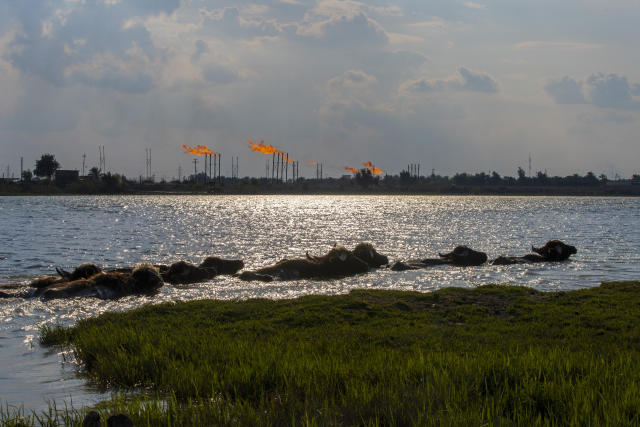Iraq's $27B deal with TotalEnergies could ease its longstanding energy crisis, but challenges remain

Views (72)

A multi-billion dollar agreement signed with France's TotalEnergies could help resolve Iraq's longstanding electricity crisis, attract international investors and reduce its reliance on gas imports from neighboring Iran, a point of tension with Washington. The $27 billion agreement signed in Baghdad on Monday after years of negotiation marks the largest foreign investment in Iraq's history. It could even help combat climate change by reducing oil flares, and relieve some of the stress on Iraq's dwindling waterways through a new desalination plant.
BAGHDAD (AP) — A multi-billion dollar agreement signed with France's TotalEnergies could help resolve Iraq's longstanding electricity crisis, attract international investors and reduce its reliance on gas imports from neighboring Iran, a point of tension with Washington.
But that's only if the parties implementing the agreement can overcome the endemic corruption and political instability that has undermined Iraq's oil sector for more than two decades.
The project also includes the construction of a seawater treatment plant that would relieve the pressure on Iraq's water resources, and a solar power plant to be built with Saudi Arabia's ACWA Power that would supply the local grid.
ExxonMobile, which saw a similar multi-project deal fall through after years of negotiations, announced in 2021 that it would be selling its shares from the West Qurna 1 oil field. London-based BP is spinning off development of the Rumaila field, Iraq’s largest.
Iraq signed an initial contract with TotalEnergies in 2021, but political disputes delayed the final signing for another two years.
TotalEnergies CEO Patrick Pouyanné nevertheless struck an upbeat tone at the signing ceremony, saying the agreement would boost Iraq's economy and create jobs, with Iraqis making up at least 80% of the project's workforce.
“It’s a very strong signal, not only to TotalEnergies to encourage to invest, but also to all other foreign investment,” he said in a statement. The company did not respond to several requests for additional comment.
The state-run Iraqi News Agency said work would begin “in a matter of days," with the Oil Ministry expecting tangible results in three years.
Oil Ministry spokesman Assim Jihad said the ministry has been trying to launch such projects for over a decade but was held back by political gridlock, the COVID-19 pandemic and the war against the Islamic State extremist group, which at one point controlled much of northern and western Iraq.
“Now there is political will to speed up implementing these kinds of projects," he said.
Bachar El-Halabi, an energy markets analyst at London-based Argus, says the megaproject “gives the country a breather” after recent years saw some oil majors pull out of Iraq.
“This should, in theory, help decrease Iraq’s dependency on Iranian gas imports, which remains a sticky point between Baghdad and Washington," he said.
Marc Ayoub, an energy policy expert at the Tahrir Institute for Middle East Policy, a Washington-based think tank, said the project could face challenges down the line.
“The political climate in Iraq is sensitive and could change at any moment,” he said.
The size of the project, and the involvement of a major multi-national company, means “there would be less room for corruption,” he added. “But you never know. There's always risk.”
___
Chehayeb reported from Beirut.
0 Likes
